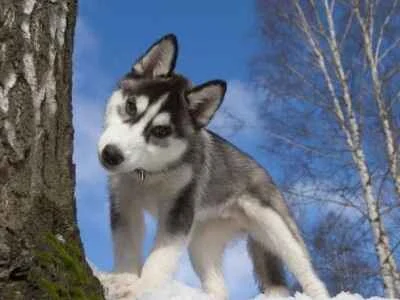 |
Siberian Husky Puppy 3 months old.Juvenile stage |
Introduction
Siberian Huskies are captivating dogs known for their beauty, intelligence, and spirited nature. Understanding the developmental stages of a Siberian Husky from puppyhood to adulthood is crucial for providing the best care and ensuring a well-balanced, happy dog. This guide will walk you through the key stages of a Husky's life and offer insights into their growth and development.
Developmental Stages of a Siberian Husky
1. Neonatal Stage (0-2 Weeks)
Characteristics:
Limited mobility, mostly crawling
Care Tips:
Ensure the puppy is warm and well-fed2. Transitional Stage (2-4 Weeks)
Characteristics:
Eyes open around 10-14 daysCare Tips:
Introduce gentle handling to aid socialization3. Socialization Stage (4-12 Weeks)
 |
Early socialization is crucial for Husky puppies as they explore the world around them. |
Characteristics:
Increased interaction with littermates and humansCare Tips:
Socialize with different people, animals, and environments4. Juvenile Stage (3-6 Months)
Characteristics:
Rapid physical growthCare Tips:
Continue consistent training and socialization5. Adolescent Stage (6-18 Months)
Characteristics:
Testing boundaries and independenceCare Tips:
Reinforce training with patience and consistency
6. Adult Stage (18 Months - 7 Years)
Characteristics:
Reached full physical maturityCare Tips:
Maintain regular exercise and mental challenges7. Senior Stage (7+ Years)
Characteristics:
Slower activity levelsCare Tips:
Regular vet check-ups to monitor health |
| Senior Huskies require extra care and comfort to ensure their golden years are happy and healthy. |
Summary
As a proud Siberian Husky owner, understanding the various stages of development is crucial to provide the best possible care and training for your furry friend. From 0-3 months, the neonatal stage, it's essential to provide a warm and safe environment, as Husky puppies are born blind and deaf. During this stage, gentle handling and socialization are crucial to help them develop good temperament.
As they enter the transitional stage (3-12 months), they'll begin to open their eyes and ears, and it's vital to introduce them to new sounds, sights, and experiences to prevent fear and anxiety. During the socialization stage (3-18 months), they'll learn to interact with their littermates and humans, so it's essential to provide plenty of playtime, exposure to new environments, and positive reinforcement training.
As they reach adolescence (1-2 years), they'll test boundaries and require consistent training and exercise to channel their energy and prevent destructive behavior. Finally, during adulthood (2-5 years), they'll require continued mental and physical stimulation, regular exercise, and training to keep them happy and healthy.
Conclusion
Understanding the developmental stages of a Siberian Husky from puppyhood to adulthood helps ensure you provide the best care tailored to their changing needs. Each stage comes with unique challenges and rewards, and being prepared for these transitions will strengthen your bond with your Husky and contribute to a fulfilling life together.
References:By understanding and catering to each developmental stage, you'll foster a strong, healthy, and happy relationship with your Siberian Husky. Enjoy the journey with your remarkable companion!





0 Comments